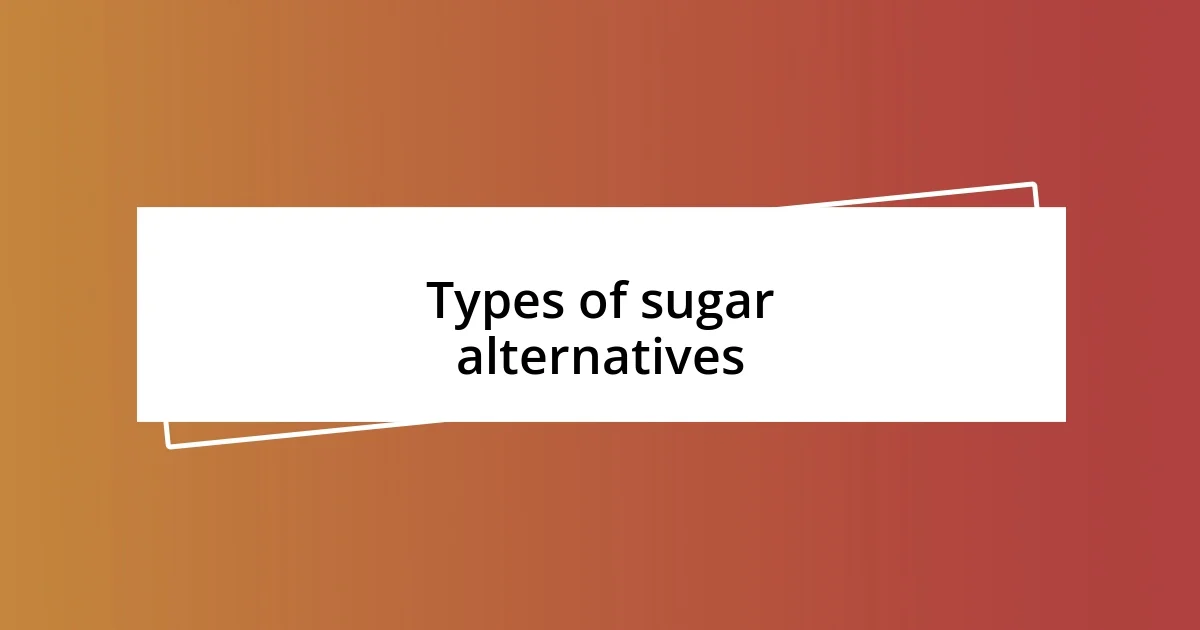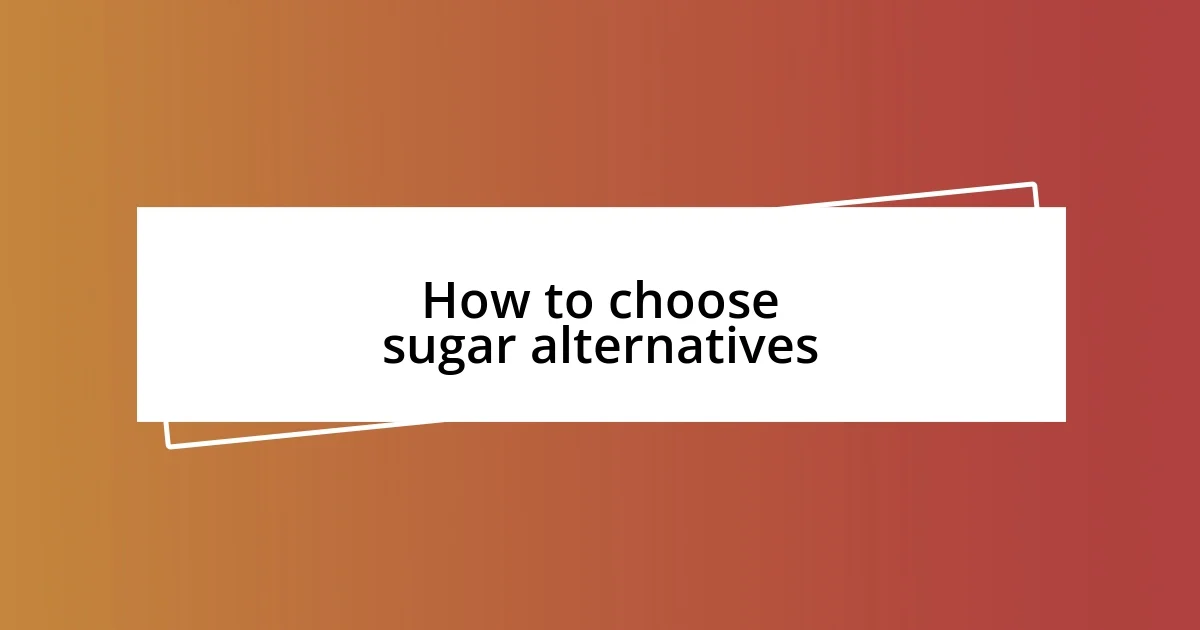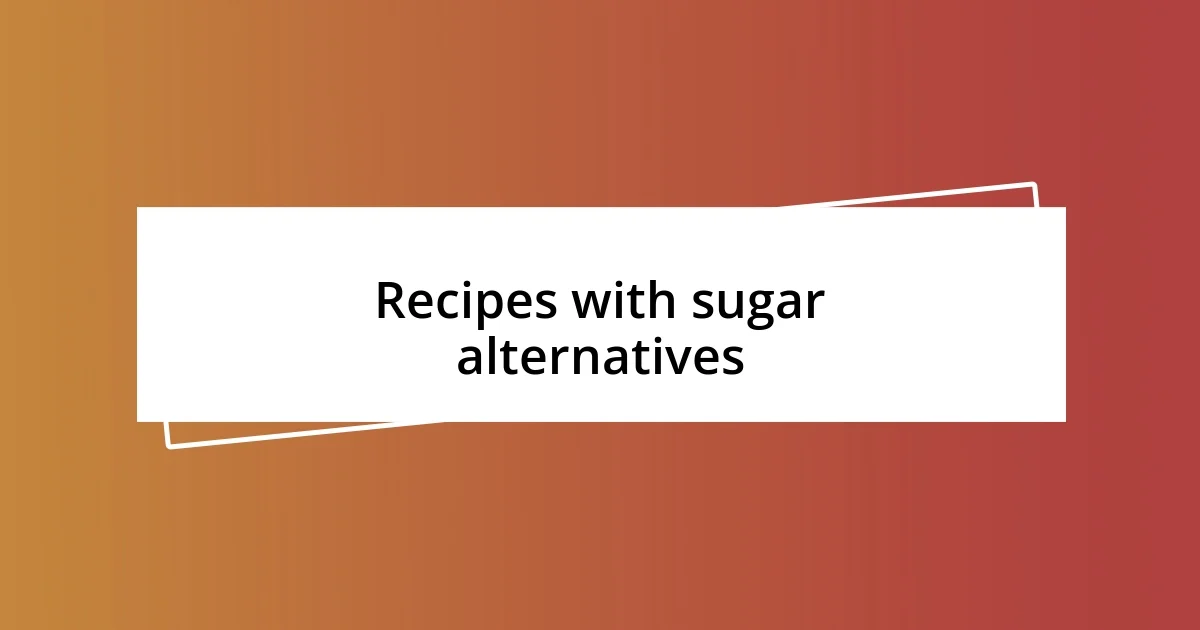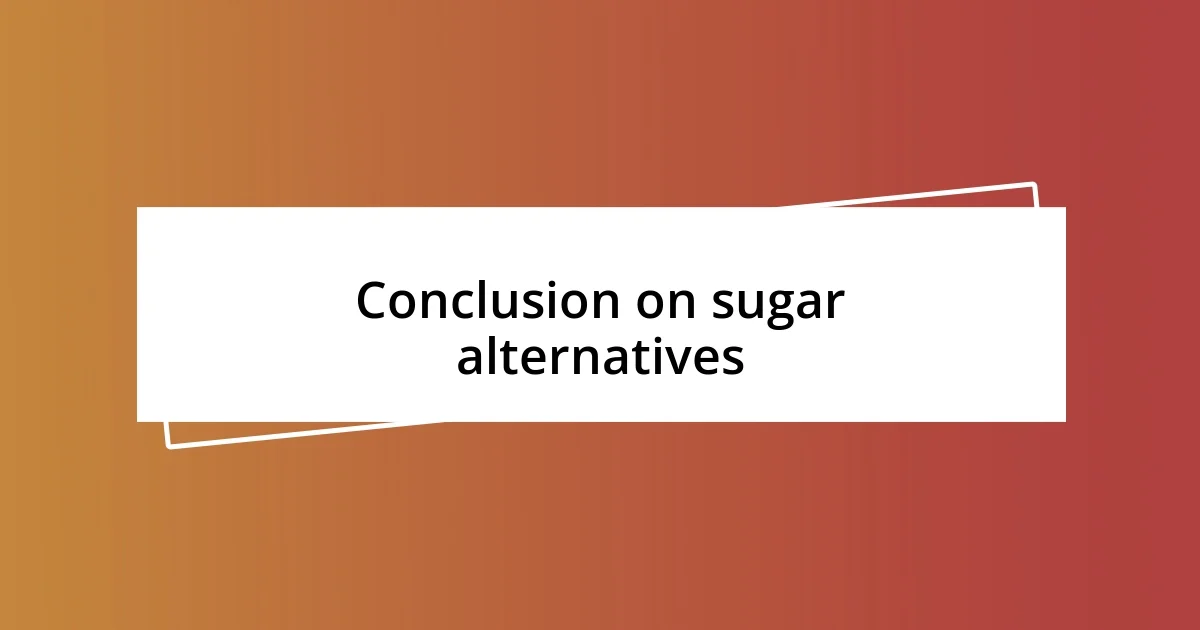Key takeaways:
- Exploration of various sugar alternatives shows unique origins and health benefits, such as erythritol’s low-calorie nature and monk fruit’s natural properties.
- Benefits of sugar alternatives include fewer calories, better blood sugar management, and improved dental health, making them appealing for health-conscious individuals.
- Choosing sugar alternatives involves considering personal health goals, taste preferences, and ingredient quality; experimentation is key to finding the right fit for individual needs.

Understanding sugar alternatives
When exploring sugar alternatives, it’s fascinating to see how many options are out there today. I remember my first encounter with stevia—it was like discovering a hidden gem! I was skeptical at first, wondering if it could really satisfy my sweet tooth without the guilt.
Understanding these alternatives requires looking at their origins and processing. For instance, monk fruit has become one of my favorites; I appreciate that it’s a natural sweetener with a unique flavor profile. It makes me wonder: how can something so sweet come from a tiny fruit? I find those curiosities deepen my appreciation for the diversity in the sugar alternative landscape.
Then there’s erythritol, which first caught my attention because it doesn’t spike blood sugar. I can’t tell you how overjoyed I was to find a sweetener I could use while managing my energy levels! It’s these little victories in understanding how different sugar alternatives affect our bodies that really make a difference in my day-to-day choices.

Types of sugar alternatives
There’s a real variety in the types of sugar alternatives available, each with its own unique characteristics and uses. Some alternatives come from natural sources, while others are more synthetic. I often find myself experimenting with these options in my cooking and baking, and it’s intriguing to see how each one can alter the flavor and texture of the final dish. Here’s a quick rundown of some popular types:
- Stevia: A plant-based sweetener derived from the leaves of the Stevia rebaudiana plant. It’s intensely sweet, so a little goes a long way.
- Erythritol: A sugar alcohol that offers sweetness without the calories, making it a favorite for those watching their sugar intake.
- Monk Fruit: Also known as luo han guo, this natural sweetener packs a punch with its sweetness while offering additional health benefits.
- Aspartame: A low-calorie artificial sweetener, commonly found in diet sodas and sugar-free products.
- Sucralose: Made from sugar but is processed to be much sweeter. When I bake with it, I notice it dissolves well and provides consistent sweetness.
Then there are those lesser-known options that have sparked my curiosity, like allulose. Just the other day, I tried it in my morning coffee, and I was pleasantly surprised! It has a texture similar to sugar, which made my drink feel indulgent without the added calories. Different types of sugar alternatives can indeed transform everyday recipes, making it an adventure as I seek to find the best fit for my palate and health goals.

Benefits of using sugar alternatives
Certainly! Let’s dive into the benefits of using sugar alternatives.
Using sugar alternatives has been a game changer for me, especially since they can have fewer calories than traditional sugar. I recall a time when I was trying to shed a few pounds; swapping out sugar for erythritol made it so much easier to enjoy sweet treats without all the guilt. It’s a win-win situation—satisfying my cravings while also helping me reach my health goals.
Another remarkable benefit I’ve experienced is the impact of sugar alternatives on blood sugar levels. For those managing diabetes or insulin sensitivity, these sweeteners can be a breath of fresh air. I remember a conversation with a friend who was thrilled to discover monk fruit. It allowed them to sweeten their morning coffee without the unintended spikes in blood sugar that often came with regular sugar. It feels empowering to see others embrace options that significantly enhance their quality of life.
Lastly, there’s the potential for sugar alternatives to support dental health. Unlike sugar, many alternatives don’t contribute to tooth decay. I can’t help but think back to my childhood, when I had to restrict sweets due to dental issues. Knowing that I can now enjoy a sweet treat without compromising my oral health feels like a newfound freedom. It’s as if these alternatives offer not just sweetness, but a way to indulge smarter.
| Type | Benefit |
|---|---|
| Erythritol | Low-calorie and doesn’t spike blood sugar |
| Monk Fruit | Natural option with additional health benefits |
| Stevia | Highly sweet, plant-based with zero calories |
| Sucralose | Processed to be much sweeter with fewer calories |
| Allulose | Similar texture to sugar, low-calorie |

Potential drawbacks of sugar alternatives
Switching to sugar alternatives might seem like a straightforward choice, but there are potential drawbacks to consider. For instance, while I appreciate the sweetness of stevia, I’ve noticed that it can sometimes leave a bitter aftertaste. Have you experienced this? It can be a bit off-putting, especially when I’m expecting a pure, sweet flavor in my recipes.
Another concern I’ve encountered is digestive discomfort associated with certain sugar alcohols, like erythritol. I remember a dinner party where I used a sugar-free dessert recipe. While it was enjoyable, I later learned that some guests had an upset stomach due to the erythritol. It made me realize how sensitive some people can be to these ingredients, causing me to think twice about my choices in the future.
There’s also the issue of the potential misleading health perceptions around sugar alternatives. I once assumed that just because something was labeled “sugar-free,” it was perfectly fine to consume in excess. But I’ve come to understand that moderation remains key. Have you ever found yourself overindulging in a sugar-free product, thinking it was guilt-free? I know I have! These moments remind me that a balanced approach is crucial, regardless of the type of sweetener I’m using.

How to choose sugar alternatives
Choosing the right sugar alternative can feel overwhelming, but I always advise starting by considering your health goals. When I decided to cut down on calories, I turned to erythritol for baking. It was a pleasant surprise how well it worked without compromising flavor. Have you tried it in your favorite recipes?
I also pay attention to the impact on taste and texture. For instance, I’ve had success with monk fruit in my tea; it adds a pleasant sweetness without an aftertaste. However, I’ve noticed that some brands can vary quite a bit in quality. Have you ever experimented with different brands just to find the one that suits your palate?
Lastly, I think it’s essential to consider dietary restrictions and preferences. For example, I strive for a more natural diet and gravitate toward stevia or monk fruit. But it’s important to read labels, as not all products are created equally. Have you ever picked up a “natural” sweetener only to discover it was blended with artificial ingredients? That’s always a disappointing moment for me!

Recipes with sugar alternatives
When it comes to crafting dishes using sugar alternatives, my go-to recipes often involve baked goods. For example, I recently made a batch of chocolate chip cookies using coconut sugar instead of traditional sugar. To my delight, they turned out deliciously chewy and had a subtle caramel flavor that was a delightful surprise! Have you ever tried swapping out sugars in your favorite dessert? It can transform the entire eating experience.
Another recipe I love is a refreshing fruit smoothie sweetened with agave nectar. I enjoy blending bananas, spinach, and a splash of almond milk, then adding just a drizzle of agave to elevate the sweetness without overwhelming the natural flavors. The beauty of this approach is that I can enjoy a nutrient-packed drink without feeling guilty. Have you explored sugary alternatives in your smoothies? It’s a game-changer for making healthier choices.
I also like experimenting with savory dishes, such as a roasted beet salad drizzled with a balsamic reduction made sweeter with a bit of honey. The combination of earthy beets with the rich sweetness is simply divine, and it really amps up the flavor profile. Have you thought about how sugar alternatives can enhance savory recipes? It’s an exciting way to add depth and complexity to your meals while keeping things balanced.

Conclusion on sugar alternatives
When considering sugar alternatives, I find myself reflecting on the balance between health and taste. It can be tempting to dive into the latest trendy sweeteners, but I often remind myself to choose those that nourish my body without sacrificing flavor. Have you ever chosen a sweetener only to discover it just didn’t hit the spot?
I believe that personal experimentation plays a crucial role in finding the right sugar alternative. It took me some time to appreciate the distinct flavors of various options, but once I discovered the joys of using date sugar in my oatmeal, it was a revelation. Have you taken the time to explore different sweeteners that could elevate your dishes in unexpected ways? The experience can truly transform your approach to cooking and baking.
Ultimately, the journey of finding the perfect sugar alternative should be enjoyable and in tune with our individual tastes and health goals. I know I’ve made choices that suited my needs, but I’m always eager to hear how others have navigated this space. Do you feel empowered by the options available, or do you find them daunting? Embracing this variety can lead to delightful culinary adventures!














